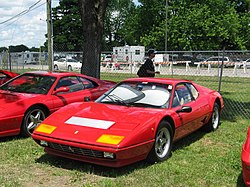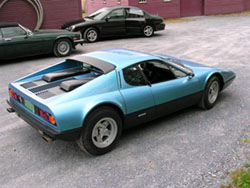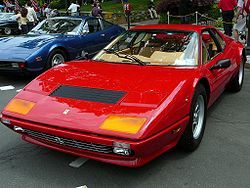Ferrari Berlinetta Boxer: Difference between revisions
Some additional facts, tighter 512BBi description, and removed claim of 0-60 in 5 seconds. It's more like 5.6 but the exact figure is variable. |
No edit summary |
||
| Line 16: | Line 16: | ||
|name=365 GT4 BB |
|name=365 GT4 BB |
||
|production=[[1973]]–[[1976]] |
|production=[[1973]]–[[1976]] |
||
|engine=4.4 L [[F12]] |
|engine=4.4 L [[flat-12|F12]] |
||
}} |
}} |
||
|- |
|- |
||
Revision as of 03:00, 1 March 2007
| ||||||||||||||||||||||
| ||||||||||||||||||||||
| ||||||||||||||||||||||
| ||||||||||||||||||||||
Berlinetta Boxer is the name for a series of cars produced by Ferrari in Italy between 1973 and 1984. They used a mid-mounted flat-12 engine, replacing the FR Daytona, and succeeded in the Ferrari stable by the Testarossa.
Production of the BB was a major step for Enzo Ferrari. He felt that a mid-engined road car would be too difficult for his buyers to handle, and it took many years for his engineers to convince him to adopt the layout. This attitude began to change as the marque lost its racing dominance in the late 1950s to mid-engined competitors. The mid-engined 4-, 6-, and 8-cylinder Dino racing cars was the result, and Ferrari later allowed for the production Dino road cars to use the layout as well. The company also moved its V12 engines to the rear with its P and LM racing cars, but the Daytona was launched with its engine in front. It was not until 1971 that a mid-engined 12-cylinder road car would appear.
365 GT4 BB
The first Boxer was the 365 GT4 BB shown at the 1971 Turin Motor Show. Designed to answer rival Lamborghini's Miura, it was finally released for sale in 1973 at the Paris Motor Show.
Though it shared its numerical designation with the Daytona, the Boxer was as different as could be. It was a mid-engined car like the Dino, and the now flat-12 engine was mounted longitudinally rather than transversely.
The engine shared its internal dimensions with the V12 from the Daytona, but was spread out to 180° as on Ferrari's 1970 Formula One car. It produced 380 hp (283 kW) at 7500rpm and was mounted above a five-speed manual transmission. One major difference in this engine was its use of timing belts rather than chains.
The Pininfarina body was an angular wedge with popup headlights and remains quite modern looking. 387 examples were built.

512BB
The 365 was updated as the 512BB in 1976, resuming the name of the earlier Ferrari 512 racer. The engine was larger at 4942 cc, but horsepower was off to 340 hp @ 6800rpm largely as a result of lower redline. Torque was up to 45.7 kgf·m (448 N·m) from 43 kgf·m (422 N·m), largely as a result of larger displacement and a longer stroke. Dry sump lubrication was used for a lower center of gravity. External differentiators included a new front spoiler, wider rear tires, added NACA side air vents ducting air to the brakes, and four tail lights (rather than six). 929 512BBs were produced.
512BBi
The Bosch K-Jetronic fuel injected 512BBi introduced in 1981 was the last of the series. The fuel injected motor produced cleaner emissions and kept the same power as the 512BB but achieved it at 6000rpm, nearly 12% lower. External differentiators from the 512BB besides badging include a change to metric sized wheels and the Michelin TRX metric tire system, small white running lights in the nose, and red rear fog lamps outboard of the exhaust pipes in the rear valence. 1,007 512BBi models were produced.
References
- Buckley, Martin & Rees, Chris (1998). World Encyclopedia of Cars. London: Anness Publishing. ISBN 1-84038-083-7.
{{cite book}}: CS1 maint: multiple names: authors list (link) - "The Ferrari Pages". Cars From Italy. Retrieved November 17.
{{cite web}}: Check date values in:|accessdate=(help); Unknown parameter|accessyear=ignored (|access-date=suggested) (help)



